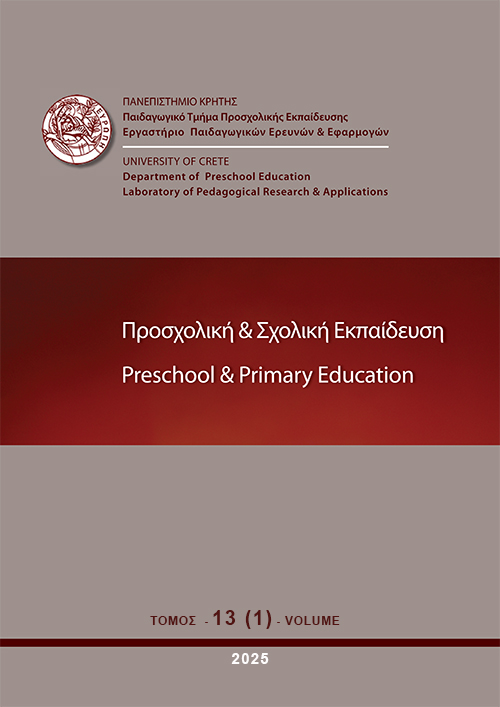Η επίδραση των επιστημικών πεποιθήσεων στις εκπαιδευτικές πεποιθήσεις και στις επιλογές διδακτικών σεναρίων υποψήφιων εκπαιδευτικών: Από τη θεωρία στην εκπαιδευτική πράξη

Περίληψη
Πολύ πριν την έναρξη των πανεπιστημιακών τους σπουδών οι υποψήφιοι εκπαιδευτικοί (ΥΕ) έχουν διαμορφώσει πεποιθήσεις για τη γνώση, τη μάθηση και τη διδασκαλία, βασισμένες στις σχολικές τους εμπειρίες. Οι πεποιθήσεις αυτές αποτελούν ένα σύνθετο σύστημα, όπου συχνά συνυπάρχουν αντικρουόμενες πεποιθήσεις οι οποίες επηρεάζουν την εκπαιδευτική διαδικασία. Ειδικότερα, οι επιστημικές πεποιθήσεις για τη φύση και τη δομή της γνώσης φαίνεται να συνδέονται στενά με πεποιθήσεις για τη μάθηση και να επηρεάζουν τις διδακτικές πρακτικές. Η παρούσα έρευνα εξετάζει: α) τις επιστημικές πεποιθήσεις 231 φοιτητών/τριών προγραμμάτων Προσχολικής Αγωγής και Εκπαίδευσης δύο Πανεπιστημιακών Τμημάτων της Ελλάδας, β) τη σχέση των επιστημικών πεποιθήσεων με τις εκπαιδευτικές πεποιθήσεις για τη διδασκαλία και τη γνωστική εμπλοκή των μαθητών και γ) την επίδραση των επιστημικών και των εκπαιδευτικών πεποιθήσεων στις επιλογές διδακτικών σεναρίων. Τα αποτελέσματα έδειξαν ότι οι πεποιθήσεις των ΥΕ παρουσιάζουν έλλειψη εσωτερικής συνοχής· αναδείχτηκαν πεποιθήσεις σε συμφωνία και ασυμφωνία ταυτόχρονα με μία κονστρουκτιβιστική επιστημολογία και μια μαθητοκεντρική προσέγγιση στη μάθηση και τη διδασκαλία. Βρέθηκε επίσης ότι μια εκλεπτυσμένη κονστρουκτιβιστική επιστημολογία αποτελεί θετικό προβλεπτικό παράγοντα: α) εκπαιδευτικών πεποιθήσεων σε συμφωνία με ένα μαθητοκεντρικό μοντέλο διδασκαλίας και β) επιλογών σε συμφωνία με ένα κονστρουκτιβιστικό ή αλληλεπιδραστικό διδακτικό σενάριο. Τα ευρήματα συζητούνται υπό το πρίσμα της Θεωρίας Πλαισίου για την εννοιολογική αλλαγή, σύμφωνα με την οποία οι αλλαγές στις επιστημικές πεποιθήσεις είναι προαπαιτούμενες για την κατανόηση και εφαρμογή σύγχρονων, κονστρουκτιβιστικών θεωριών μάθησης.
Λεπτομέρειες άρθρου
- Πώς να δημιουργήσετε Αναφορές
-
Κυριακοπούλου Ν., & Σκοπελίτη Ε. (2025). Η επίδραση των επιστημικών πεποιθήσεων στις εκπαιδευτικές πεποιθήσεις και στις επιλογές διδακτικών σεναρίων υποψήφιων εκπαιδευτικών: Από τη θεωρία στην εκπαιδευτική πράξη. Preschool and Primary Education, 13(1), 50–82. https://doi.org/10.12681/ppej.39414
- Ενότητα
- Άρθρα

Αυτή η εργασία είναι αδειοδοτημένη υπό το CC Αναφορά Δημιουργού – Μη Εμπορική Χρήση – Παρόμοια Διανομή 4.0.
Οι συγγραφείς των άρθρων που δημοσιεύονται στο ΠΡΟΣΧΟΛΙΚΗ & ΣΧΟΛΙΚΗ ΕΚΠΑΙΔΕΥΣΗ διατηρούν τα δικαιώματα πνευματικής ιδιοκτησίας επί των άρθρων τους, δίνοντας στο περιοδικό το δικαίωμα της πρώτης δημοσίευσης. Άρθρα που δημοσιεύονται στο ΠΡΟΣΧΟΛΙΚΗ & ΣΧΟΛΙΚΗ ΕΚΠΑΙΔΕΥΣΗ διατίθενται με άδεια Creative Commons 3.0 και σύμφωνα με την άδεια μπορούν να χρησιμοποιούνται ελεύθερα, με αναφορά στο/στη συγγραφέα και στην πρώτη δημοσίευση για μη κερδοσκοπικούς σκοπούς και με δικαίωμα τροποποίησης μόνον με παρόμοια διανομή (αν αναμείξετε, τροποποιήσετε, ή δημιουργήσετε πάνω στο υλικό, πρέπει να διανείμετε τις δικές σας συνεισφορές υπό την ίδια άδεια όπως και το πρωτότυπο). To Εργαστήριο Παιδαγωγικών Ερευνών και Εφαρμογών του Παιδαγωγικού Τμήματος Προσχολικής Εκπαίδευσης του Πανεπιστημίου Κρήτης και το Εθνικό Κέντρο Τεκμηρίωσης διατηρούν το δικαίωμα να δημοσιεύουν, να αναπαραγάγουν, να παρουσιάζουν στο κοινό, να διανέμουν και χρησιμοποιούν άρθρα που δημοσιεύονται στο ΠΡΟΣΧΟΛΙΚΗ & ΣΧΟΛΙΚΗ ΕΚΠΑΙΔΕΥΣΗ σε οποιοδήποτε μέσο και μορφή είτε μεμονωμένα είτε ως μέρη συλλογικών έργων, για όλο το χρόνο διάρκειας προστασίας της πνευματικής ιδιοκτησίας και για όλες τις χώρες του κόσμου. Αυτό περιλαμβάνει ενδεικτικά και όχι αποκλειστικά, το δικαίωμα δημοσίευσης των άρθρων σε τεύχη του περιοδικού ΠΡΟΣΧΟΛΙΚΗ & ΣΧΟΛΙΚΗ ΕΚΠΑΙΔΕΥΣΗ, αναπαραγωγής και διανομής μεμονωμένων αντιγράφων των άρθρων, αναπαραγωγής ολόκληρων των άρθρων σε άλλη έκδοση του Εργαστηρίου Παιδαγωγικών Ερευνών και Εφαρμογών του Παιδαγωγικού Τμήματος Προσχολικής Εκπαίδευσης του Πανεπιστημίου Κρήτης και του Εθνικού Κέντρου Τεκμηρίωσης και αναπαραγωγής και διανομής των άρθρων ή περίληψης αυτών με χρήση πληροφορικού συστήματος αποθετηρίου.


